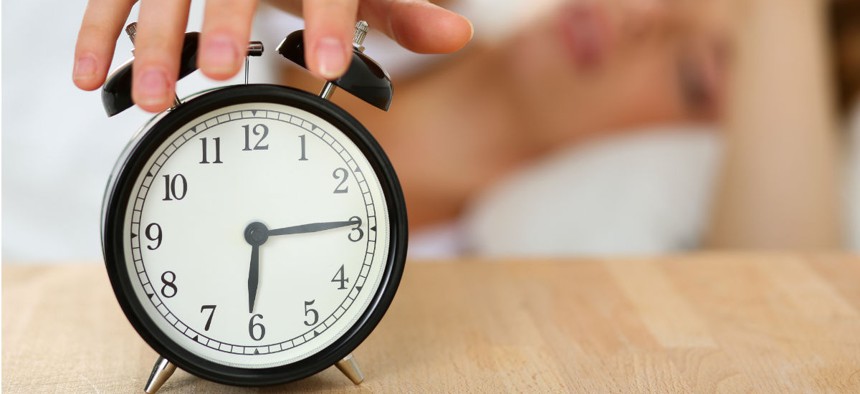Society Is Messing With Your Sleep
A new study of different countries' slumber habits hints at how culture shapes bedtimes.
When you go to bed, is it because you’re tired or because you need to get up at a certain time and want to make sure you get enough sleep?
Everyone has a chronotype, which is the sleep cycle that their body would naturally prefer, if left to its own devices. But society forces its own chronotypes on people, too. Maybe your perfect sleep cycle is from 2 a.m. to 10 a.m. But if you have a typical 9-to-5 workday, to get eight hours, you’d probably need to sleep from something like 11 p.m. to 7 a.m., or midnight to 8 a.m. If you work the night shift, you might end up having to sleep through the afternoon.
Individuals’ sleep is surely shaped by their jobs, their families, and their habits. But a new study shows that society can shape sleep broadly, on a population level, as well. In the paper, published in Science Advances, Olivia Walch, Amy Cochran, and Daniel Forger of the University of Michigan look at data gathered from a smartphone app to see how sleep cycles vary in different countries and among different demographics.
They designed the app, called Entrain, to help people deal with jet lag by offering recommendations for when they should sleep to adjust to their new time zone. When people sign up for the app, they’re given the option to submit their data for research by answering questions about when they usually go to bed, when they usually wake up, where they live, and whether they’re usually exposed to more indoor or outdoor light. Data from 5,450 users was included in this study.
Using sunrise and sunset times, the researchers used a mathematical model to figure out what a “normal” bedtime and wake time would be for each of the users’ locations, and compared that to their actual reported wake times and bedtimes. For this study, they excluded shift workers, whose schedules aren’t even pretending to be tied to the sun.
There was some variation just by demographic—as people get older, they tend to sleep less and wake up earlier (although after 50, it seems people start getting up a little later again), and women tend to sleep longer than men. “Women schedule more sleep at nearly every age group, by both going to bed earlier and waking up later,” the study reads.
What country people lived in didn’t have any noticeable effect on when they woke up, but it was linked to what time they went to bed. And what time they went to bed was linked to how much sleep they got. So in the countries that got less sleep on average, like Japan and Brazil, it was because they were going to bed later, not because they were waking up earlier than people in countries that got more sleep on average, like the Netherlands and Belgium, where people have earlier bedtimes.
“Those country differences and societal pressures really manifest themselves in the evening,” Forger says.
Why is anybody’s guess. My initial thought was that maybe wake times were so standardized because of business hours—people were alarming themselves awake within a small window of time. But Forger says that wake times tended to correspond with what the model predicted based on when the sun rises. People in places with earlier sunrises tended to get up earlier. “If this hypothesis that it’s only the alarm clock [controlling people’s wake time] was true, that wouldn’t matter very much,” Forger says.
So what’s going on in societies with later average bedtimes? Are people up partying all night? Or are they doing a lot of looking at screens before they go to sleep, which has been shown to keep people awake longer?
“Our study asks a lot more questions than it answers,” Forger says. “We’ve not solved world sleep, not even close.”
To be sure, this study’s data comes only from people who have smartphones, and who travel enough to want to download an app to help with jet lag, which suggests probably a higher level of affluence than the average population. But it’s notable in pointing out bedtime as a problem area. A lot of the research and discussion about the tension between sleep and society has focused on the morning—how the 9-to-5 workday isn’t suitable for everyone’s internal clocks, how starting the school day later can help teens, who have notoriously late chronotypes, how exposing yourself to light in the morning can help keep your internal clock wound in a way that promotes good sleep.
Bedtime, meanwhile, seems like it should be more of a choice (at least when your parents aren’t choosing it). You wake up to go somewhere, or to start fulfilling responsibilities, and you go to bed when you decide to, based on a complex calculus of how tired you are, how much sleep you want to get, and whether the chapter you were just reading in your book ended on a cliffhanger. But when people are deciding to go to bed differs significantly across societies, it seems there’s something cultural at play here, too. And it will fall to future studies to figure out what that is.







